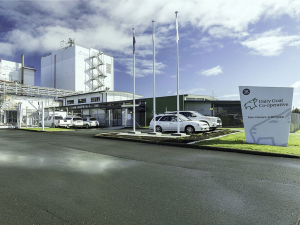Dairy goat farmers hopeful co-op will turn a corner
Farmer owners of the Dairy Goat Co-operative (DGC) in Hamilton say they believe in the business’s long-term future.
 Leadership changes and a revamped manufacturing strategy are in place to help Dairy Goat Co-operative navigate challenges in the Chinese export market.
Leadership changes and a revamped manufacturing strategy are in place to help Dairy Goat Co-operative navigate challenges in the Chinese export market.
A new leadership team and a revamped manufacturing strategy is in place to help Hamilton-based Dairy Goat Co-operative navigate challenges in one of its key export markets, China.
In recent weeks, the farmer-owned co-operative has appointed a new chairman, Rene Burri, and chief executive Alastair Hulbert. Its product mix is also changing: while DGC will continue manufacturing goat milk infant formula, it is also diversifying into bulk ingredient sales.
Farmer shareholders are backing the new strategy and unanimously agreed to reduce their milk supply by 35% for the coming season to help the co-op navigate through the challenges.
Hulbert, an experienced chief executive with a record of leading significant change, told Rural News that DGC remains an impressive business.
He says the co-op is an industry leader with diversified global market presence and opportunities for growth.
“Although things have recently been tough for DGC and its shareholders, it remains a strong viable business despite having to navigate the current challenges.”
DGC has faced several headwinds since Covid-19, particularly with the China market due to disruptions in the Daigou sales channel and a delay in the formal China SAMR market access registration.
But Hulbert points out that despite these setbacks, the overall global market footprint remains strong with export sales of goat milk infant formula to approximately 30 countries – most of which are performing as expected.
He’s confident that DGC will lift its financial performance in the coming years.
“While this situation is challenging for shareholders, DGC is on track to meet our significant F24 ingredient sales target and have a pipeline of new opportunities which will help improve company performance in years to come,” he says.
“We expect to see an improvement in profitability and payout in the 2024/25 season and further recovery over the next few seasons.”
Hulbert says the drop in infant formula sales and consequent shift in product mix have affected the co-op’s profitability and in turn its milk payout to farmers.
At a special shareholder meeting last month, the DGC board announced that the current season’s forecast milk payout will remain at $11/kgMS.
While the revised payout is lower than previous years, Hulbert says DGC maintains a strong balance sheet and a strategic plan focused on recovery and growth.
He thanked shareholders for agreeing to reduce their milk supply, saying this will allow DGC to meet sales demand and preserve returns.
“Although the reduction in volume is challenging for farmer profitability, shareholders voted unanimously in favour of this proposal,” he notes.
Before the special shareholders meeting, former DGC chair Campbell Storey stepped down. Shareholders appointed former Fonterra executive Graham Stuart as his replacement on the board. While Storey was a farmer-elected director, shareholders backed a board recommendation to appoint Stuart, an independent director, to replace him. Shareholders also appointed Richard Cookson as deputy chair.
Burri, first elected to the DGC board in 2021, and his family run their dairy goat farm just out of Te Aroha, milking around 600 goats.
“As a dairy goat farmer, I am well aware of how challenging the current climate is for our farmers,” he told Rural News.
“The DGC board are fully focused on returning company performance to more sustainable levels.”
Donald Trump's latest tariff tantrum has again thrown the world of trade into a new round of turmoil and uncertainty, and NZ is caught up in it.
The third edition of the NZ Dairy Expo, held in mid-February in Matamata, has shown that the KISS principle (keep it simple stupid) was getting a positive response from exhibitors and visitors alike.
Twenty years ago, South African dairy farm manager Louis Vandenberg was sent to a farm in Waikato to provide training on Afimilk technology.
Strong farmgate milk price is helping boost investment on farms, says PGG Wrightson chief executive Stephen Guerin.
Fonterra's 460 milk suppliers in Australia, who will switch to Lactalis end of this month, are unfazed with the impending change.
The 5+ A Day Charitable Trust has launched a collection of affordable recipes designed to turn everyday vegetables into seasonal stars.

OPINION: A mate of yours truly reckons rural Manawatu families are the latest to suffer under what he calls the…
OPINION: If old Winston Peters thinks building trade relations with new nations, such as India, isn't a necessary investment in…